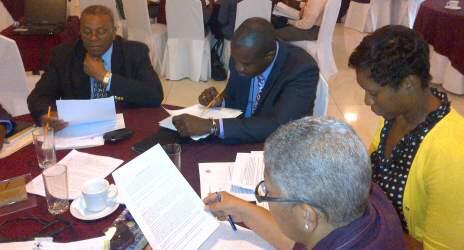
The findings of the study, which used as its benchmark the recommendations of the Guidelines for the domestic facilitation and regulation of international disaster relief and initial recovery assistance (IDRL Guidelines), were largely confirmed by the participants.
Representatives at the consultation meeting included government agencies, international donors, NGOs, as well as the Jamaica Red Cross (JRC) and the International Federation of Red Cross and Red Crescent Societies (IFRC). They shared valuable and diverse experiences and held a lively discussion on mechanisms for facilitating the entry of disaster relief goods and personnel into the country.
While Jamaica’s disaster management laws do not currently address the facilitation of international relief, Ms Tania Chambers, who carried out the study, reported that many of the key elements of the IDRL Guidelines were reflected in the practices and procedures developed over time by the country’s disaster response system. “Expedited processes, waivers and special arrangements had all formed part of Jamaica’s disaster response history. However, the reinforcement of these facilities in national law and policy is a necessary next step in enabling international donors to engage with a stable and predictable governance structure,” Ms Chambers noted.
IFRC Disaster Law Programme Coordinator for the Americas, Ms Isabelle Granger, highlighted the importance of the study for the development of disaster management policies in Jamaica and the Caribbean. “While Colombia, Peru and Haiti have all initiated legislative changes to improve their legal framework for international disaster response, Jamaica is leading the English-speaking Caribbean in developing policy positions in this area.” She encouraged the engagement of Caribbean policymakers in ongoing dialogue on IDRL through regional discussions such as the “Enhancing International Partnership Meeting,” scheduled to take place in Jamaica during 2013.
Participants were in favour of developing an enabling environment for established donor partners. At the same time, they cautioned against opening up to an influx of ad hoc donors in the wake of a major disaster. The event’s moderator and a regional expert on disaster policy, Dr Barbara Carby, reminded the group that “regulating the flow of ad hoc donors is intrinsic to responsible emergency management, and issues of security, safety and health should continue to frame decision-making.”
The IDRL study was led by the Jamaica Red Cross and included legal research, stakeholder interviews, questionnaires and a workshop held in the summer of 2012. JRC Director General, Ms Yvonne Clarke, thanked the range of state agencies that participated in the process. Primary among these was the Office of Disaster Preparedness and Emergency Management (ODPEM), which chaired the project’s oversight committee and provided administrative support. ODPEM’s Deputy Director General, Mr Richard Thompson, underscored his organisation’s commitment to improving the legal framework for disaster management and noted that the law in this area is currently being updated. As a concurrent effort, ODPEM has been working with the Ministry of Local Government and Community Development to prepare a Compendium of Laws and Regulations impacting disaster relief.
The Jamaica IDRL study will be completed and published for local and regional distribution in the upcoming weeks.